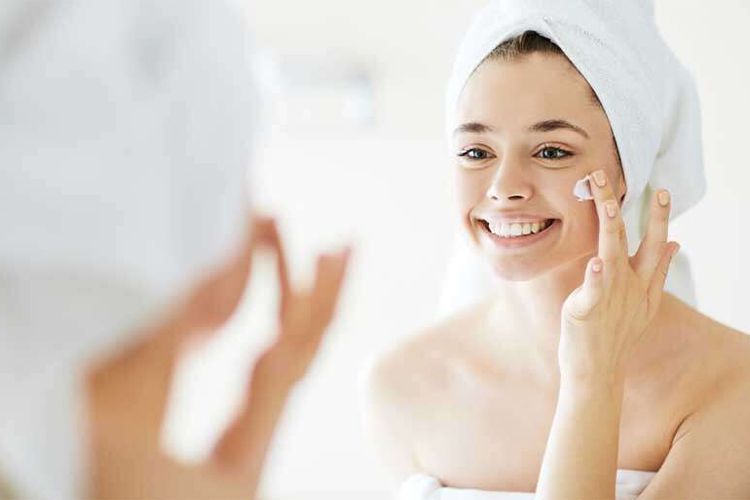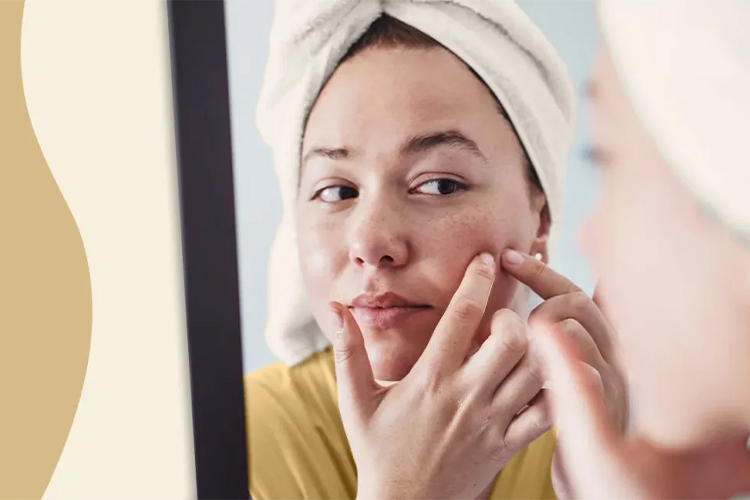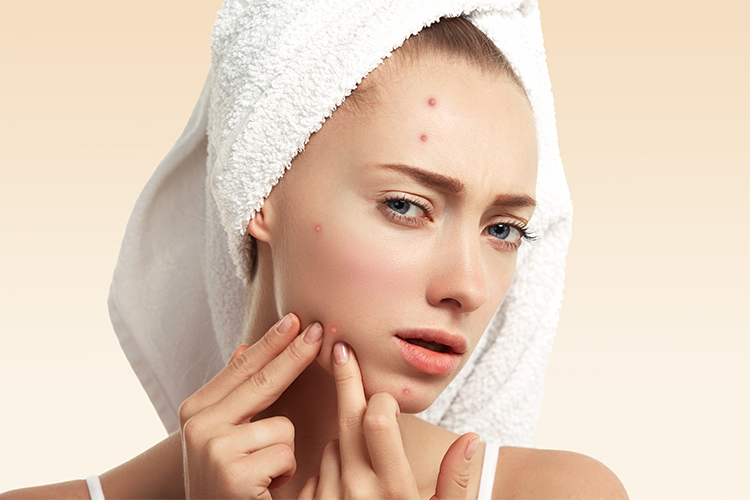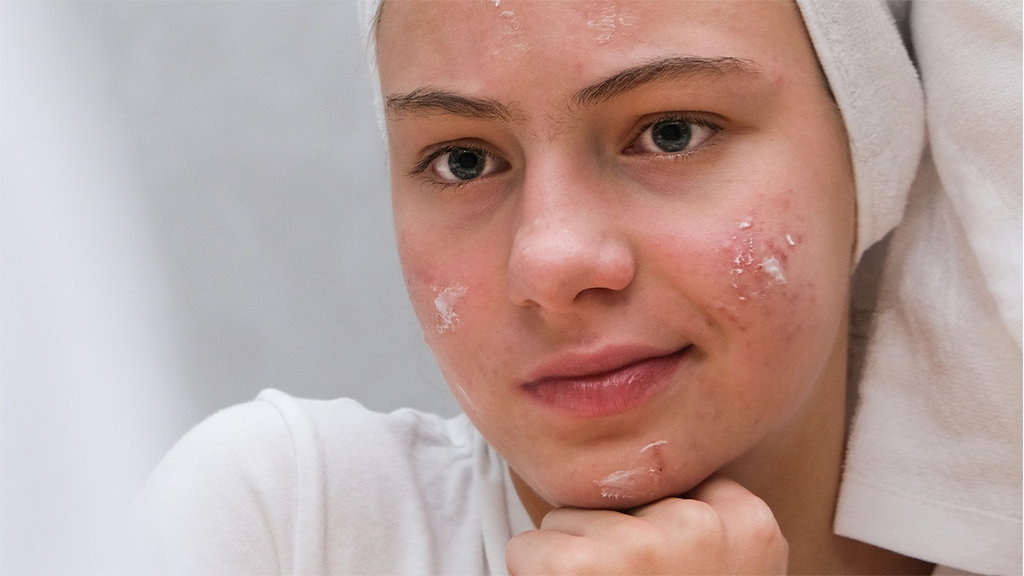We all turn to home remedies and quick fixes to treat occasional breakouts. One of them is baking soda for acne. It is probably the most common DIY hack to get rid of the pimples. While there’s no scientific evidence that baking soda works for acne, you can find plenty of anecdotal evidence to support this trick. Baking soda can be harsh on the skin, so you need to be extremely careful before trying this trick. It can dry out and irritate your skin. However, there are safe ways to use baking soda for acne. Scroll down to learn how baking soda can affect your skin and how to safely use it for acne.
Can You Use Baking Soda For Acne? Is it effective?
Anecdotal evidence suggests that baking soda is a natural remedy for acne. Some suggest that it helps treat acne by acting as a facial cleanser and can help with oil control with regular use. However, there is no research to judge whether or not baking soda works for acne. The US Food and Drug Administration has not approved this popular home remedy for acne. Proponents of this popular home remedy believe that baking soda can help relieve your acne, depending on your skin type.
Baking soda is said to have a drying effect on the skin and this property helps reduce pimples and reduce inflammation. It is also said to help in the following ways:
Baking soda has anti-inflammatory properties that help reduce swelling and redness. Not only does it help relieve flare-ups, but it also soothes rashes, irritation, and sunburn.
Baking soda is a great ingredient for a body exfoliator. It contains fine particles that loosen dirt and dead skin cells from your pores. It’s also relatively less irritating than most chemical peels while being more effective.
Not only does it help fight and prevent acne, but it also minimizes the appearance of acne scars and pigmentation.
It helps absorb excess oil from your skin. This, in turn, dries up pimples and blemishes and helps them heal faster.
If you have oily or extremely oily and acne-prone skin, you can try baking soda. However, there is no scientific research to show that baking soda is good for acne or your skin. Hence, you need to be very careful while using this ingredient. Baking soda can cause severe discomfort if it’s not right for your skin or if you use it excessively. Check them out in the next section.

Are There Side Effects of Using Baking Soda for Acne?
Yes, there are some risks associated with using baking soda on your skin. Anything beyond that is not good for the skin. The same goes for baking powder. If used too often or if it doesn’t suit your skin, the following side effects may occur:
It could damage your skin’s protective barrier and make your acne worse. This is because your skin’s pH is slightly acidic (which is crucial for maintaining the balance). When you apply baking soda, the protective acid barrier is removed and the skin becomes more susceptible to pimples and bacteria.
Skin irritation may occur. Baking soda has a drying effect, and if you apply it to your skin (or use it too frequently), it can irritate skin and cause redness, breakouts, rashes, and burning sensations.
It could overdry your skin and cause inflammation.
The average natural pH value of the skin (without showering and cosmetic products) is 4.7. Normally it is between 4.5 and 5.5. On the pH scale, anything below 7 is acidic and anything above 7 is alkaline. While our skin is acidic, baking soda has a pH of 9, which is alkaline. When you apply an alkaline ingredient to your skin, it naturally strips away its natural oils, exposing it to UV rays, bacteria and environmental damage.
While not recommended, you can try some baking soda recipes to fight inflammation. Make sure you only use the recommended baking amount and do not exceed it. Also, don’t follow any of these recipes more than once a week.
How to use baking soda for acne
1. Baking soda and lemon
you will need
2 tablespoons baking powder
2 tablespoons of water
1 teaspoon lemon juice
method
Mix baking soda, water and lemon juice in a bowl. Make a smooth paste.
Apply a thin layer of the paste to your face and leave on for 15 minutes until dry.
Wash your face with cold water.
Follow with a moisturizer or skin serum.
Use this face mask twice a week.
Why this works
Lemon juice helps control oil production in your skin while minimizing your pores with its astringent properties (1). It also has antimicrobial properties that can help kill acne-causing bacteria (2).
Caution: Lemon juice (and most citrus juices) can make your skin sensitive to sunlight, which can lead to sunburn. Therefore, be sure to apply sunscreen before leaving the house.
2. Baking soda and water
you will need
2 tablespoons baking powder
1-2 tablespoons water (adjust amount)
method
Mix baking soda and water. Adjust the amount of water to get a smooth paste.
Apply the paste only to the affected areas. Leave it on for 10-15 minutes and then wash off with cold water.
Then apply a moisturizer. Do this twice a week.
Why this works
Baking soda removes built-up dirt and dead skin cells from the pores. It is also said to dry out the pimples, shrink them and make them heal faster. This can also be helpful in preventing pimples as well as removing blackheads and blackheads.

3. Baking soda and apple cider vinegar
you will need
1 tablespoon baking powder
1 tablespoon of water
1 tablespoon apple cider vinegar
method
Dilute the apple cider vinegar with water.
Add baking soda to the ACV-water mixture.
Apply the paste to the affected areas (like a spot treatment). Leave it on for 10-15 minutes.
Wash with cold water.
Apply a moisturizer.
Do this twice a week.
Why this works
Apple cider vinegar is said to help maintain pH balance and prevent the baking soda from making your skin too alkaline. Apple cider vinegar also contains lactic acid, which may help reduce acne (3).
4. Baking soda and honey
you will need
1 tablespoon of organic honey
1 tablespoon baking powder
washcloth
Warm water
method
Mix baking powder and honey in a bowl.
Apply the paste to your entire face or just to the affected area.
Soak the washcloth in warm water and wring it out. Put it on your face and wait 5 minutes.
Once the washcloth has cooled, wipe the mask off with it.
Wash your face with cold water and apply a moisturizer.
Repeat this 2-3 times a week.
Why this works
Honey is a humectant that locks moisture into your skin (4). This mask can help prevent acne and give you clear skin.

5. Baking Soda and Aloe Vera
you will need
1 teaspoon baking powder
1 teaspoon of aloe vera gel
method
Mix both ingredients and make a paste.
Apply the mixture to the affected area with your fingers. Let it dry for 15-20 minutes.
Wash your face with cold water.
Then apply a moisturizer.
Repeat this treatment 2-3 times a week.
Why this works
Aloe Vera has anti-inflammatory and antimicrobial properties (5). This blend reduces redness and inflammation and helps heal acne quickly.
6. Baking soda and witch hazel
you will need
1 teaspoon baking powder
A few drops of witch hazel (adjust amount as needed) A cotton swab
method
Mix baking soda and witch hazel in a bowl.
Apply the paste to the affected area with the cotton swab (just like small dots on the acne). Leave it on for 10-15 minutes and then wash your face with lukewarm water.
Then apply a moisturizer.
Repeat this remedy 2-3 times a week.
Why this works
Witch Hazel is a natural astringent that unclogs and tightens your skin’s pores. It also has anti-inflammatory effects on your skin (5). Thus, it can help reduce redness and irritation caused by acne.
7. Baking soda, yogurt and lemon
you will need
½ teaspoon baking powder
1 teaspoon of yogurt
1 drop of lemon juice or lemon essential oil
method
Mix all the ingredients until you get a creamy, paste-like mass.
Apply it to the affected areas and leave it on for 5-10 minutes.
Rinse your face with lukewarm water and pat dry.
Follow with a face serum or moisturizer.
Why this works
Lemon, along with baking soda, helps to shrink skin pores and unclog them. Lemon contains vitamin C, which has antioxidant properties and can prevent signs of aging. Yogurt helps keep your skin hydrated (6).
Note: If you have very sensitive skin, dilute the lemon juice with water before use to prevent allergies.
8. Baking soda and aspirin (for spot treatment)
you will need
1 teaspoon baking powder
2 aspirin tablets (crushed)
water (as needed)
A cotton swab or swab
method
Place the baking soda and aspirin tablets in a bowl and mix with water.
Apply the paste to the affected area with the cotton swab or cotton swab in spots. Leave on for 15 minutes.
Wash with lukewarm water.
Pat your skin dry and apply a moisturizer.
Why this works
Although no study shows that topical treatments containing aspirin could cure acne, it may help reduce inflammation (7). Aspirin contains salicylic acid (which is great for acne) and may help reduce breakouts (8).
Some other natural ingredients recommended for acne treatment besides baking soda are turmeric, cinnamon, coconut oil, and tea tree oil. You can also consult a dermatologist to see if benzoyl peroxide can be used to reduce acne spots.
Discover the potential risks and benefits of using baking soda on your face in this informative video. Get expert insight and make informed decisions about your skincare routine.
In summary, using baking soda for acne is a controversial home remedy with no scientific evidence to support its effectiveness. While some people claim that baking soda can help treat acne by reducing inflammation, exfoliating skin, and absorbing excess oil, it can also be harsh and potentially harmful to skin.
Baking soda has a high alkaline pH, which can disrupt the skin’s natural acidic pH, causing irritation, dryness, and damage to the skin’s protective barrier. It can worsen acne and make skin more susceptible to bacteria and UV damage.
Additionally, excessive or frequent use of baking soda can cause skin irritation, redness, rashes, and burning sensations. It’s important to do a patch test before applying baking soda to your face and use it in moderation.
If you are considering using baking soda to treat acne, it is advisable to consult a dermatologist first. A dermatologist can provide personalized advice and recommend safer and more effective acne treatments depending on your skin type and condition.


